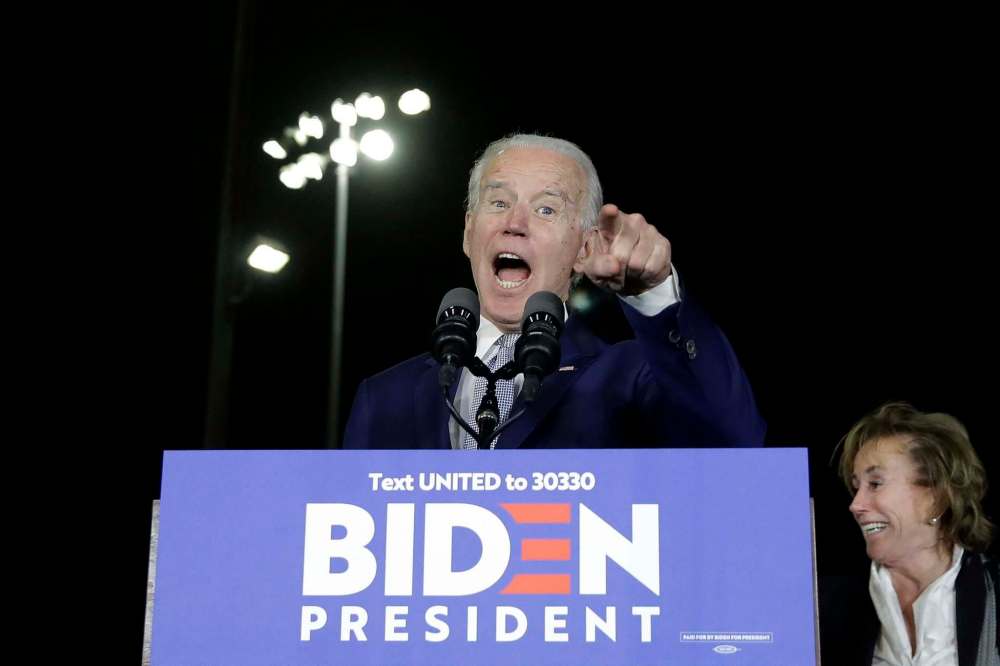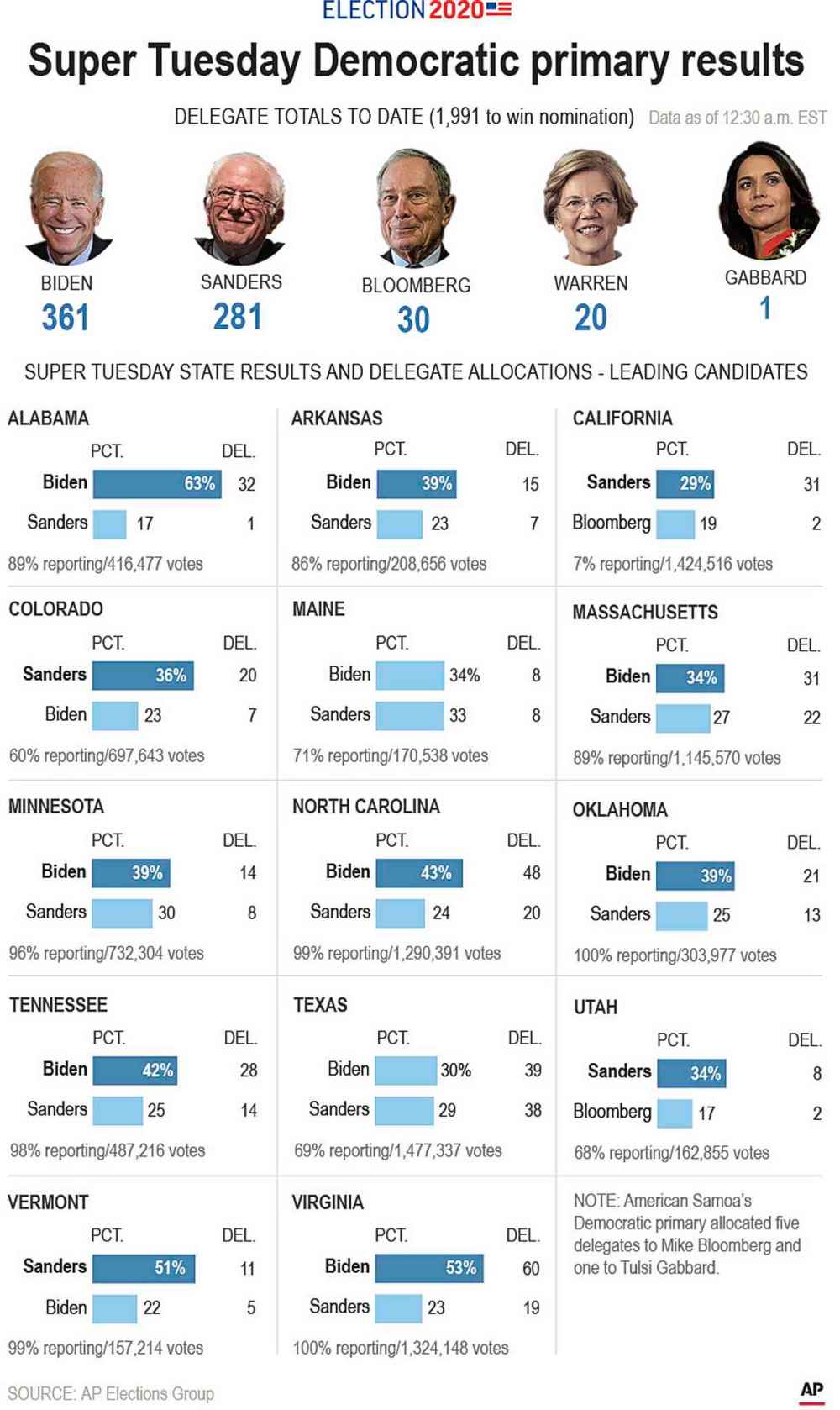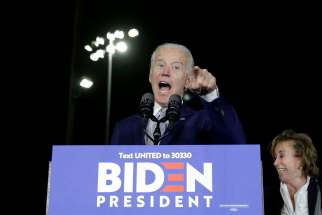Super Tuesday narrows the field
Read this article for free:
or
Already have an account? Log in here »
To continue reading, please subscribe:
Monthly Digital Subscription
$0 for the first 4 weeks*
- Enjoy unlimited reading on winnipegfreepress.com
- Read the E-Edition, our digital replica newspaper
- Access News Break, our award-winning app
- Play interactive puzzles
*No charge for 4 weeks then price increases to the regular rate of $19.00 plus GST every four weeks. Offer available to new and qualified returning subscribers only. Cancel any time.
Monthly Digital Subscription
$4.75/week*
- Enjoy unlimited reading on winnipegfreepress.com
- Read the E-Edition, our digital replica newspaper
- Access News Break, our award-winning app
- Play interactive puzzles
*Billed as $19 plus GST every four weeks. Cancel any time.
To continue reading, please subscribe:
Add Free Press access to your Brandon Sun subscription for only an additional
$1 for the first 4 weeks*
*Your next subscription payment will increase by $1.00 and you will be charged $16.99 plus GST for four weeks. After four weeks, your payment will increase to $23.99 plus GST every four weeks.
Read unlimited articles for free today:
or
Already have an account? Log in here »
Hey there, time traveller!
This article was published 04/03/2020 (2106 days ago), so information in it may no longer be current.
This much is now clear: the next president of the United States of America will be an old white man.
With the much-ballyhooed “Super Tuesday” cavalcade of primary elections and caucuses in 14 states now decided, the field of legitimate contenders for the Democratic Party’s 2020 presidential nomination has effectively been reduced to two: Bernie Sanders, 78, and Joe Biden, 77.
The current U.S. president, Donald Trump, is 73.

What remains to be seen, then, is which type of old white man Americans will prefer as their commander in chief: the old-school Democrat seeking to unite his party through compromise, common sense and situational combativeness, the radical-left independent who’s not actually a Democrat, and who proposes a revolutionary shift toward a more socialist America, or the populist incumbent who in four short years has upended the American political establishment and forced the Republican Party to essentiallly abandon its traditional values in expedient support of a president whose cult-of-personality power can make a casualty of any elected Republican who dares to question or oppose him.
It did seem, for a short while, that Americans might see a ballot with a bit more demographic diversity. At the outset of the Democratic nomination race, the overcrowded roster of presidential hopefuls on the left of the political spectrum included young and old, male and female, straight and gay; the first Democratic debate resembled a true rainbow coalition, with a dozen-plus distinctive candidates vying for the public’s attention.
From the get-go, Mr. Sanders — who had maintained his focus on 2020 after losing the bitterly contested 2016 nomination to Hillary Clinton — was the presumptive frontrunner. Mr. Biden’s decision to enter the race came reluctantly, driven by a realization that his party needs a credible and non-radical Democrat at the top of the ticket to take a legitimate run at unseating Mr. Trump.
Bit by bit, the rainbow tapestry unravelled as the diverse Democrats fell by the wayside. Most recently, after last week’s South Carolina primary was won by Mr. Biden, former South Bend, Ind., mayor Pete Buttigieg and Minnesota Sen. Amy Klobuchar dropped out in advance of Tuesday’s big vote.
On Wednesday, billionaire and former New York City mayor Michael Bloomberg — a late entry in the Democratic contest who had strategically skipped the early primaries and focused all his efforts (and a big chunk of his half-billion-dollar advertising expenditure) on the Super Tuesday states — ended his candidacy after a particularly dismal showing.
As of Wednesday, Massachusetts Sen. Elizabeth Warren remained in the race, despite having won no state primaries so far and only accumulating a few dozen delegates to support her. With a platform that seems caught between the radical-change agenda of Mr. Sanders and the mainstream-Democrat sensibility of Mr. Biden, Ms. Warren’s presidential aspiration has dead-ended.
In the aftermath of Super Tuesday, which saw the formerly struggling Mr. Biden ride the wave of last week’s South Carolina triumph to victory in at least nine more states, it suddenly seems more likely that the main event in November’s U.S. election will be Trump vs. Biden rather than Trump vs. Sanders. The momentum now belongs to the erstwhile V.P.
The ever-bombastic Mr. Sanders will fight on, but his failure to win widespread support among African American voters will likely have sealed his fate by the time the Democratic National Convention finalizes the nominee selection in July.
Come November, Americans will choose between two candidates who, despite both being old white men, couldn’t possibly be more different.












